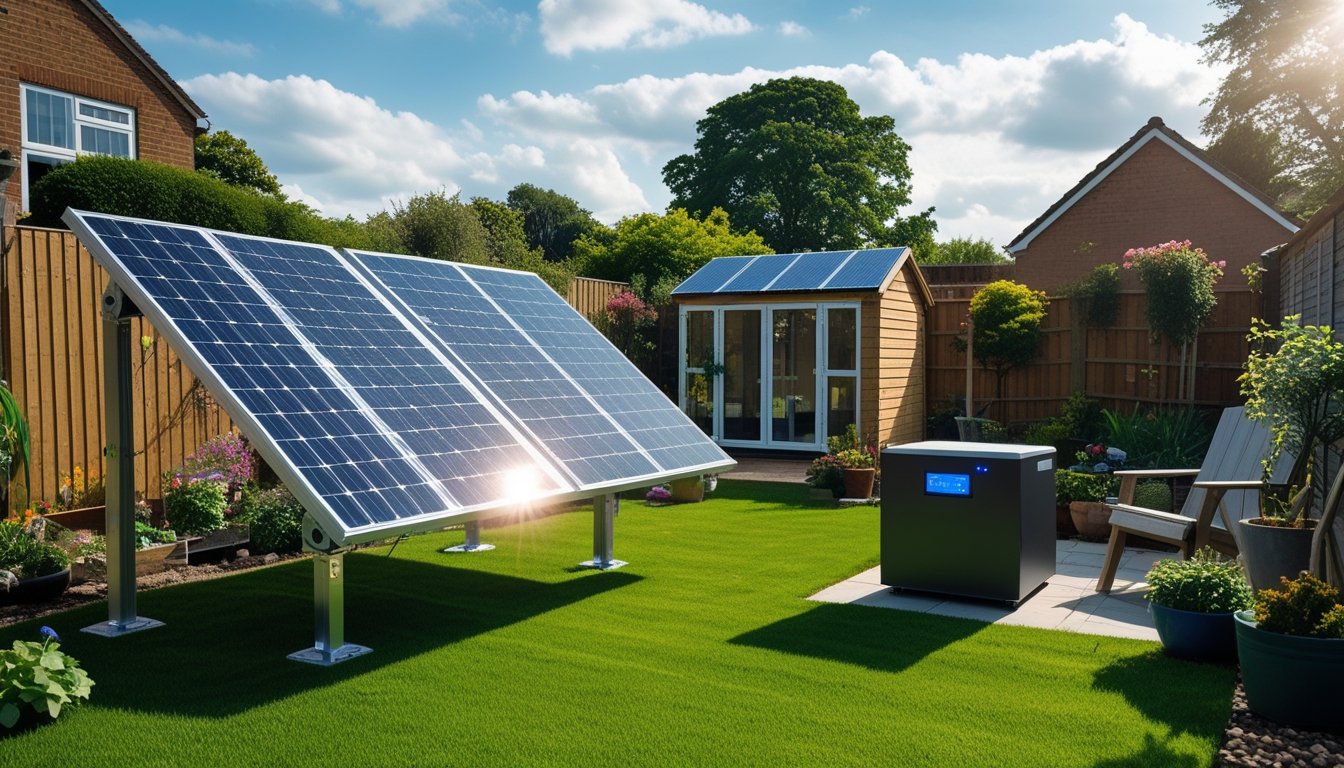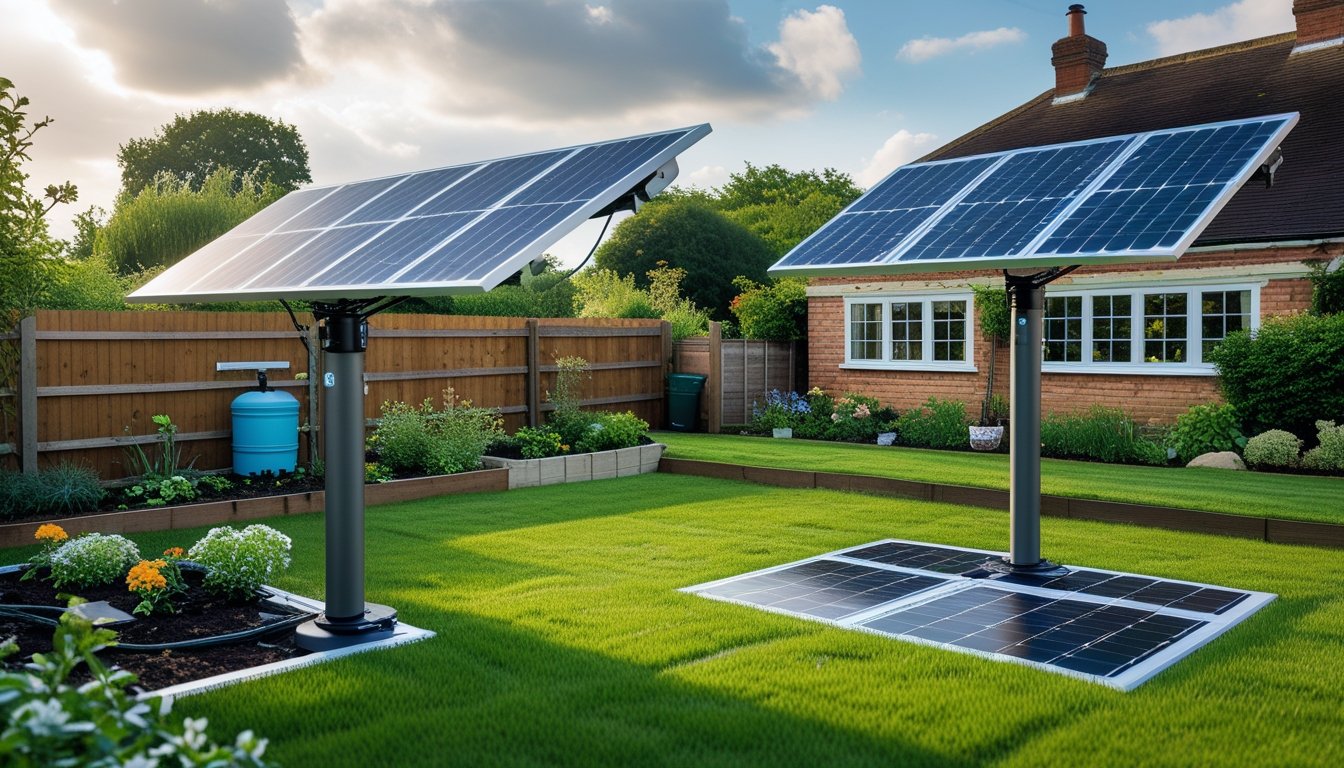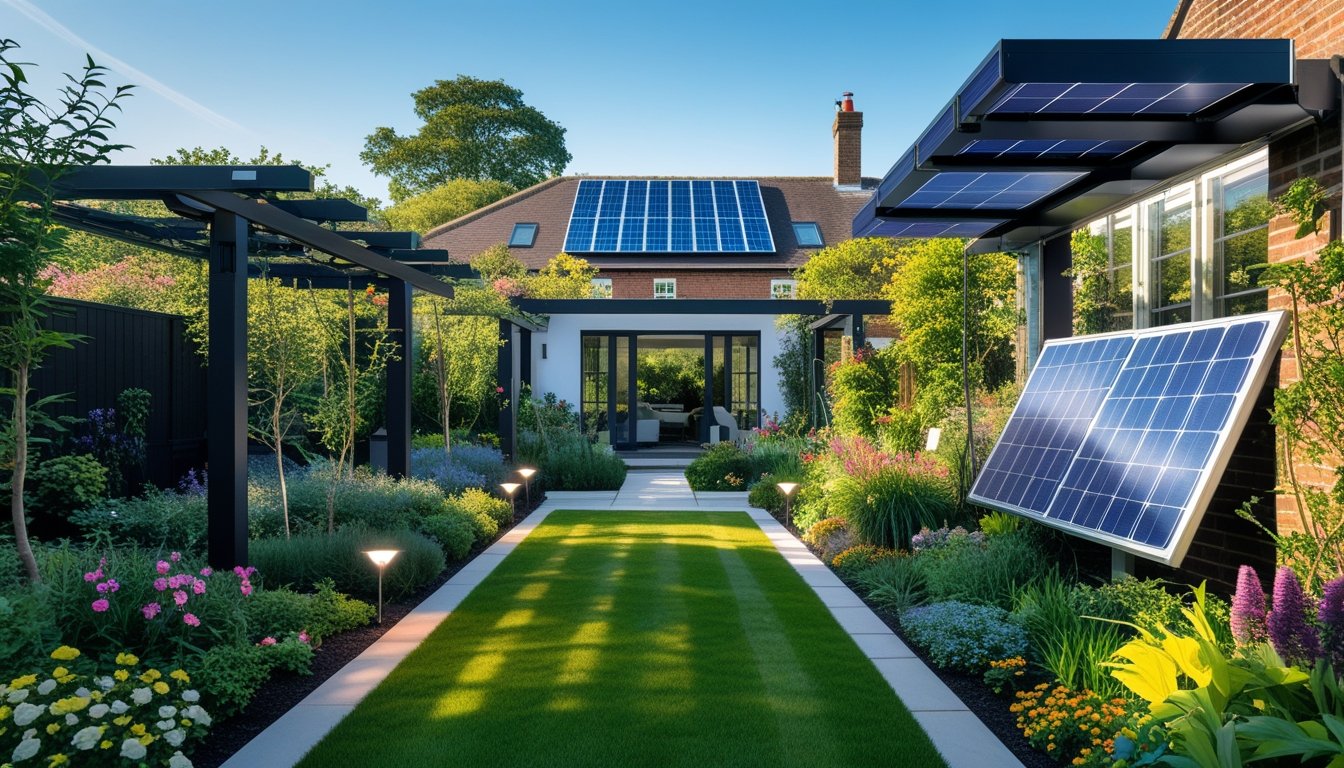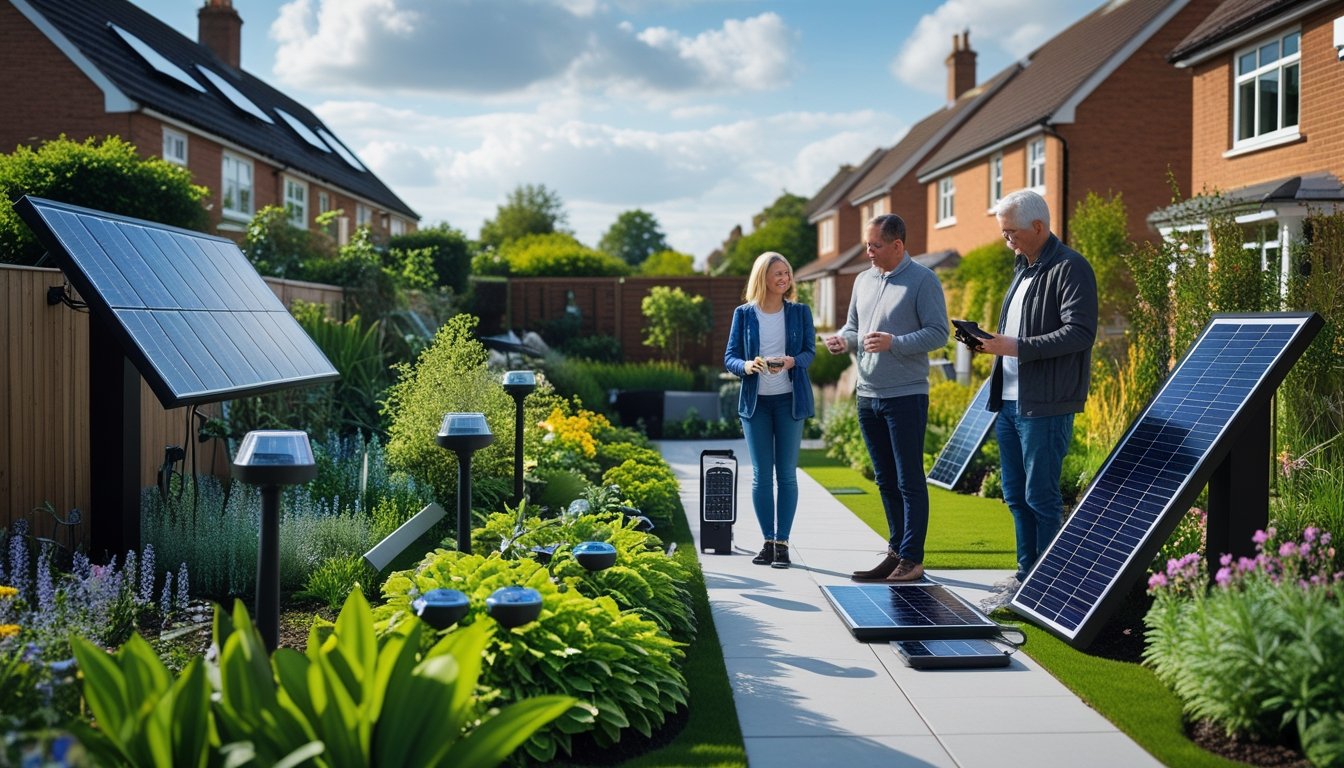Late updated: 16 Sep 2025 10:09
Written by: Eleanor Hartman
Innovative Solar Power Solutions For UK Gardens: Enhancing Eco-Friendly Outdoor Spaces
Exploring innovative solar power solutions opens up exciting possibilities for UK gardens. As traditional roof-mounted systems may not suit every household, ground or portable garden panels offer practical alternatives. These systems can significantly reduce energy bills while enhancing the sustainability of our outdoor spaces. Ground-mounted solar panels provide a versatile option, particularly for gardens that receive ample sunlight and where roof space is limited.

Smaller setups, such as solar-powered garden lights or portable panels, add flexibility and charm to our gardens. From powering electric devices to creating a warm, ambient atmosphere with lighting, the benefits of solar integration are plentiful. By harnessing solar energy, UK homeowners can transform their gardens into eco-friendly hubs that reflect a commitment to sustainable living.
Incorporating solar technology into garden design not only aligns with the UK's green energy goals but also empowers homeowners to take control of their energy consumption. Whether it’s through a comprehensive ground-mounted system or a bespoke arrangement of solar lights, we can find a solution that fits our garden's unique characteristics and energy needs.
Key Takeaways
- Ground-mounted solar panels offer flexibility and efficiency.
- Solar-powered devices enhance garden sustainability and aesthetics.
- Implementing solar technology supports UK energy goals.
Innovative Solar Power Solutions Tailored for UK Gardens

Our gardens can transform into environmentally-friendly power hubs with the integration of solar solutions. By incorporating solar lighting, water features, irrigation, and smart technologies, we enhance both functionality and sustainability.
Solar Lighting Systems for Outdoor Spaces
Solar lighting offers practical enhancements for outdoor spaces. These systems harness sunlight to provide energy-efficient illumination for paths, decking, and garden features. Motion sensors, solar-powered LEDs and variable brightness settings are notable features.
Not only do they reduce electricity costs, but they also add security by ensuring well-lit areas. Their installation is simple with no requirement for complicated wiring, making them a popular choice for homeowners keen on straightforward solutions. Adaptable to specific needs, these systems are an excellent addition.
Solar Water Features and Fountains
Water features powered by solar energy add elegance and ambience without the environmental cost. By utilising sunlight, they maintain continuous operation throughout daylight hours. Solar pumps, often used in these features, are quiet and efficient.
In gardens where traditional electric installations are challenging or undesirable, solar solutions are ideal. They allow us to enjoy the calming sound of running water while being conscious of our environmental impact. Available in varying styles and sizes, solar fountains seamlessly blend practicality with aesthetics.
Eco-Friendly Solar Irrigation for Gardens
Innovative solar-powered irrigation systems present a sustainable way to maintain gardens. These systems use solar panels to power water pumps and distribution networks, ensuring plants are watered efficiently. This reduces water consumption and promotes healthy plant growth.
In regions susceptible to water scarcity, solar irrigation systems are an invaluable asset. By automating watering schedules, they contribute to garden upkeep without constant human intervention. This frees up time for other gardening activities while helping conserve valuable resources.
Integrated Smart Solar Solutions for Modern Gardens
Advanced solar solutions integrate cutting-edge technologies with traditional gardening practices. Smart sensors and mobile apps offer control over garden environments, from lighting to irrigation. This integration enhances the accessibility and efficiency of garden management.
These systems ensure optimum use of solar energy by adjusting operations based on weather conditions and energy storage. By harnessing smart technologies, we improve garden sustainability and convenience, creating gardens that are not only green but also truly intelligent.
Implementing and Maximising Solar Technology in Your Garden

Implementing solar technology in our gardens involves selecting suitable products for the British climate, installing them correctly, and integrating them seamlessly into existing designs. These steps ensure that we achieve long-term efficiency and sustainability.
Selecting the Best Solar Products for British Climates
When choosing solar products for our gardens, considering the variability of the British weather is crucial. Products designed to perform well despite lower sunlight levels are ideal. Look for solar panels with excellent performance in diffused light and high-efficiency ratings.
It is also important to choose products that withstand the UK's weather extremes. Panels that are durable against rain and wind should be prioritised. Additionally, exploring innovations like solar glass panels, which are both aesthetically pleasing and functional, could enhance our garden space while providing practical energy solutions.
Installation Tips and Maintenance for Longevity
Proper installation ensures that our solar technology performs optimally. Placing panels at the correct angle and orientation to capture maximum sunlight throughout the year is vital. Hiring skilled professionals can help avoid costly mistakes and maximise sunlight exposure.
Regular maintenance extends the life of our system. This includes cleaning the panels to remove debris and checking for any signs of wear. We should establish a routine to inspect our equipment and make necessary adjustments or repairs promptly. Keeping the system in peak condition increases its efficiency and lifespan.
Integrating Solar Solutions with Existing Garden Designs
Integrating solar technology into our garden design enhances both functionality and aesthetics. We can incorporate solar panels into existing structures like pergolas or trellises, which provides both shelter and power. Making use of solar trees offers unique visual appeal and effective space utilisation.
Lighting is another element that can benefit from solar integration. Solar-powered garden lights can be strategically placed to maintain the visual appeal while reducing energy costs. By carefully blending these technologies with our existing layout, we create a garden that is both beautiful and eco-friendly.
Frequently Asked Questions

In the evolving landscape of solar power solutions for UK gardens, understanding the options available ensures that you make the most informed decision. From installation costs to design considerations, various factors come into play.
What are the most cost-effective solar power systems for domestic gardens?
Domestic gardens benefit from a variety of cost-effective solar systems. Monocrystalline panels often offer the best efficiency, though polycrystalline panels present a more economical choice while still performing well. Flexible solar panels are a newer option, providing versatility and lower costs.
How can I integrate solar technology into a small urban garden?
Utilising solar technology in a limited urban space involves creativity and strategic planning. Wall-mounted or roof-integrated solar panels optimise vertical space. Solar-powered garden lights and small fountains can enhance aesthetics without requiring much room.
What advancements in solar storage solutions are suitable for garden installations?
Recent advancements in solar storage provide efficient solutions for gardens. Lithium-ion batteries offer better storage capacities. Solar generators are compact alternatives, ideal for powering small garden tools or keeping lights running during cloudy days.
Are there bespoke solar panel designs available for unique garden landscapes?
Yes, bespoke solar panel designs cater to unique garden layouts. Custom-shaped panels blend seamlessly into various landscapes. Coloured panels offer aesthetic flexibility, allowing them to enhance a garden’s visual appeal while serving functional purposes.
How do planning regulations impact the installation of solar panels in gardens?
Planning regulations can vary by location, affecting solar panel installations. In many areas, small installations don't require planning permission, but conservation areas may impose stricter rules. Checking with local councils ensures compliance with all relevant guidelines.
What is the expected lifespan of a garden solar power installation?
Typically, a garden solar power installation has a lifespan of 20-25 years. Maintenance, quality of components, and environmental factors influence longevity. Regular inspections and cleaning aid in maintaining efficiency and prolonging the system’s lifespan.